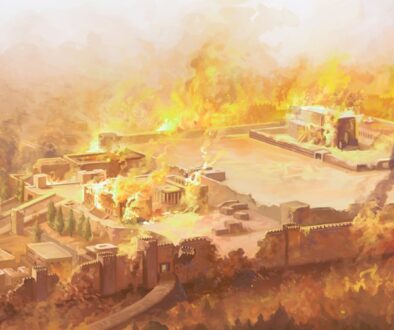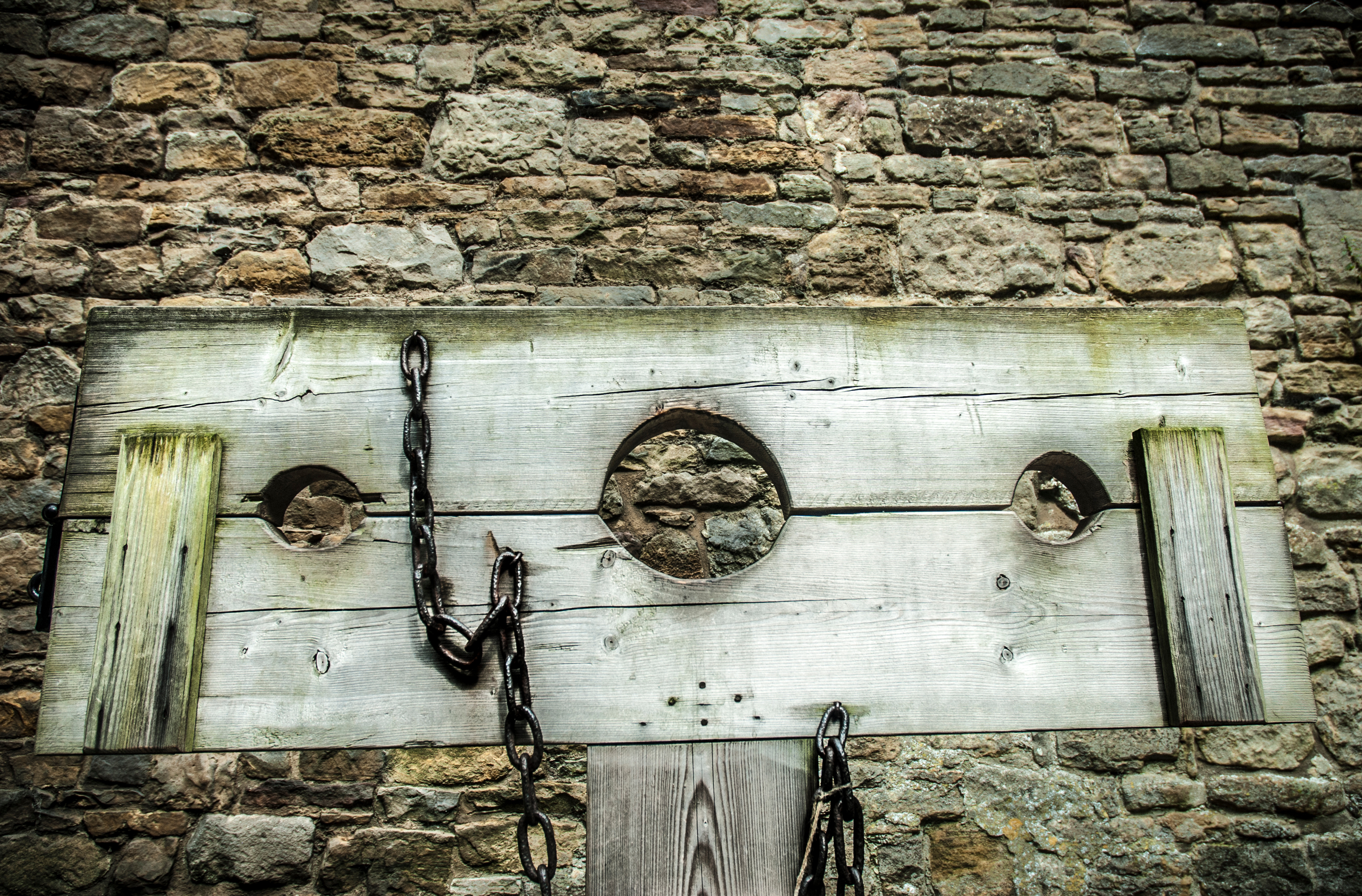1 Kings 18 He’s Back

Ahab has been looking for Elijah without success. God tells Elijah that it is time for the rain to return. He’s back in Israel to meet with Ahab.
When I was a child, my favorite bible story was the wisdom of Solomon as he delt with the two prostitutes and the one living child. I don’t know for certain what it was that spoke to me in this story. It was probably the mother’s love for her child and how Solomon recognized it as a mark of the true mother.
As an adult, I still LOVE that story, but the story of Elijah challenging the prophets of Baal to a showdown ranks right up there beside Solomon. I can see it all playing out in front of me in my mind, and I can’t help but laugh. The contest that was NO contest at all. That’s not all we see today though. We see Elijah pop up out of ‘nowhere’ first. So, let’s rejoin our story as the hunt for Elijah continues.
♥ ♦ ♥
Ahab’s men have been searching for him since a few months after his confrontation with Elijah. He keeps sending more and more brigades out to scour the world for him. Ahab is not stopping at national boundary lines. He is determined to find Elijah and make him pay for the trouble he has caused.
Jezebel is also furious with Israel’s God. Rather than focus on Elijah, her focus is on His prophets. She has men out actively seeking prophets of God and putting them to death. She is determined that Baal be the only god in Israel.
Obadiah is a high-ranking servant of Ahab but also a man who honors God in all he does. He has taken it upon himself to protect the prophets of God. He knows that he can’t save them all, so he settles for one hundred of them. The day Jezebel dispatched her executioners, Obadiah works long into the night assembling his list of those he will hide away. He has three criteria for those on his list: 1) The words they say come to pass; 2) They honor the Lord in their daily lives; and 3) They will remain hidden and not reveal themselves or their brothers.
Obadiah’s list quickly fills with candidates. He chooses two caves where he will hide them. Obadiah knows these caves well, as he frequented them in his youth. Each cave will comfortably hold 50 men. He has to furnish these caves with mats, cooking equipment, and sources of light.
Obadiah will have to help in furnishing the caves, getting the prophets safely tucked away, and maintaining supply runs to them. As much as he wants to, he knows he cannot do this alone. But the best kept secrets are held by two men, when one is dead. As dangerous as it is, he has to share his secret.
“Lord God of Abraham, Isaac, and Jacob, bring men alongside me that I can trust to care for Your prophets. Men who will maintain the secret of their location, even upon pain of death. Men who won’t even divulge that there are prophets in hiding. Men who can perform the tasks that I cannot do alone.”
With the break of morning, several men come to see Obadiah on their own. One by one they come, asking for time with Obadiah. The Lord has raised them up to help Obadiah and His prophets.
Two days later, the caves are ready and the fist of the prophets arrive at their new ‘home’. It takes less than a week to have all 100 secreted away. Weekly food runs and drop off locations are arranged, and Obadiah returns to his normal routine, under the eye of the king.
The longer the drought continues, the more frantic Ahab becomes. After three years, he is downright desperate. The streams and rivers are running dry. There is no water for irrigating plants, and the livestock are in danger of death if something doesn’t change soon. Ahab has a plan. He calls Obadiah to hear his plan and help him carry it out.
“Go through the land to all the springs of water and to all the valleys. Perhaps we may find grass and save the horses and mules alive, and not lose some of the animals” (1 Kings 18:5).
“I cannot do this alone my king” Obadiah replies.
“I am planning on searching for water with you. You will go one way and I another. Whoever finds a good source will meet back up with the other.”
Obadiah nods and the two men walk out to the king’s chariots. They proceed through the city and out the gate together. At the fork in the road, just outside the city, they bid each other goodbye.
“I wish you success” Ahab calls out from his chariot.
“May the Lord guide our search” offers Obadiah, which elicits him a hard stare from Ahab.
Ahab knows that Obadiah is a God-fearing man, but he is still angry with the Lord and Elijah for the mess they are in.
Both ride off in opposite directions on their search.
While Ahab and Obadiah are on their search for water, the Lord speaks to Elijah in Zarephath. He tells Elijah that it’s time for the rain.
“Go, show yourself to Ahab, and I will send rain upon the earth” (1 Kings 18:1).
Elijah is up and out the door on his way to Ahab in minutes. He is unaware of the depth and breadth of Ahab’s search for him, so he shows no fear as he makes his way back into Israel. He isn’t certain why, but his feet are not taking him to Samaria. He does not argue with his feet, for he is certain they are walking the direction the Lord set for him.
Elijah is overjoyed when he sees a familiar face in the distance. It is Obadiah. Elijah keeps walking toward him. As soon as Obadiah recognizes Elijah, he pulls his chariot to a halt, gets out, runs over to where Elijah is standing and falls on his face before him.
“Is it you, my lord Elijah?” (1 Kings 18:7b)
Elijah smiles as he answers Obadiah. “It is I. Go, tell your lord, ‘Behold, Elijah is here’” (1 Kings 18:8).
Fear seizes Obadiah. He rises to his knees, clutching his heart. With eyes as round as moons he pleads with Elijah.
“How have I sinned, that you would give your servant into the hand of Ahab, to kill me? As the Lord your God lives, there is no nation or kingdom where my lord has not sent to seek you. And when they would say, ‘He is not here,’ he would take an oath of the kingdom or nation, that they had not found you. And now you say, ‘Go, tell your lord, “Behold, Elijah is here.”’ And as soon as I have gone from you, the Spirit of the Lord will carry you I know not where. And so, when I come and tell Ahab and he cannot find you, he will kill me, although I your servant have feared the Lord from my youth. Has it not been told my lord what I did when Jezebel killed the prophets of the Lord, how I hid a hundred men of the Lord’s prophets by fifties in a cave and fed them with bread and water? And now you say, ‘Go, tell your lord, “Behold, Elijah is here”’; and he will kill me” (1 Kings 18:9-14)
Elijah sees the fear in Obadiah’s eyes and understands it. He had no idea the Ahab was searching so diligently for him. He gives Obadiah a solemn promise not to run away and hide from Ahab.
“As the Lord of hosts lives, before whom I stand, I will surely show myself to him today” (1 Kings 18:15)
Obadiah rose from the ground. His hands were still trembling a little, but he would do as Elijah had instructed. He did not fear for his safety any more. Elijah would not trick him. He would not escape. But Obadiah still had to withstand the immediate fury of Ahab when he tells him of Elijah’s words.
It takes just over two hours for Obadiah to locate King Ahab. When Ahab sees Obadiah coming, he believes he is bringing a good report.
“What have you found?”
“I have found the prophet Elijah.”
Ahab’s face goes red. “What does he want? Did you kill him? I will give you up to half of my kingdom if you killed him for me!”
“He did not say what he wanted, beyond seeing you. And, I did not kill him. He is a man of God, and I am more afraid of God than I am of any man.”
“I will go and see him. You continue the search.”
Ahab rides off in the direction Obadiah came from. Obadiah shouts out the landmarks for Ahab to follow. Ahab has no problem following Obadiah’s instructions, back to the place where Elijah waits for him.
As Ahab approaches, he calls out to Elijah. “Is it you, you troubler of Israel?” (1 Kings 18:17).
Elijah calls back to Ahab with the truth. “I have not troubled Israel, but you have, and your father’s house, because you have abandoned the commandments of the Lord and followed the Baals. Now therefore send and gather all Israel to me at Mount Carmel, and the 450 prophets of Baal and the 400 prophets of Asherah, who eat at Jezebel’s table” (1 Kings 18:18-19).
Ahab was loath to be ordered around by Elijah but he needed the drought to end. If doing Elijah’s bidding would end the drought, then so be it. Ahab returned to his palace and sent an edict throughout the land.
“All people are to gather at Mount Carmel in two days’ time. Elijah the prophet of the Lord commands it.”
The prophets of Baal were easier to summon as they were at Jezebel’s table every evening. Jezebel’s table is in the temple of Baal. Ahab enters the temple at mealtime. He walks to the head of the table and faces the prophets. “You will assemble at Mount Carmel in two days’ time. Elijah the prophet of the Lord commands it.”
Whispers flow through the room. “I’ve always wanted to see what he looks like.” “I wonder what he wants.” “O I want to take him on!” “Who is he to ‘command’ us?”
Ahab ignores the whispers. He looks around the room and waits until heads begin to nod. “I will see you then.”
“I WON’T be there” announces Jezebel. “I won’t dignify that man with my presence. HE does not ‘command’ anything from me.”
“As you wish my queen” Ahab answers. He inclines his head to Jezebel and leaves the temple.
Two days later and the people surround Mount Carmel. They stand waiting to see what is going to happen. Whispers flow through the crowd, just as they did in the temple of Baal. “I wonder what he is going to do.” “Have you ever heard him speak?” “What does he look like?” “Will he do signs and wonders?”
Elijah stands on a small noll on the mountain. It is the place where Abraham had built an altar to the Lord. It was in disrepair but could still be identified as a landmark. Elijah holds his hands in the air to get the people’s attention. When all eyes are on him he begins.
“How long will you go limping between two different opinions? If the Lord is God, follow him; but if Baal, then follow him” (1 Kings 18:21).
The people remained silent. They didn’t know what to say.
Elijah looks out over the people. He knows they are not going to answer. He goes on. “I, even I only, am left a prophet of the Lord, but Baal’s prophets are 450 men…”
Elijah points to where the prophets of Baal are standing to the left of him. At the mention of them, they begin puffing up their chests and standing as tall as possible. Elijah shakes his head and blows out a small snort at their behavior.
“… Let two bulls be given to us, and let them choose one bull for themselves and cut it in pieces and lay it on the wood, but put no fire to it. And I will prepare the other bull and lay it on the wood and put no fire to it. 24 And you call upon the name of your god, and I will call upon the name of the Lord, and the God who answers by fire, he is God” (1 Kings 18:22-24a).
The people are pleased with Elijah’s proposal. “It is well spoken” (1 Kings 18:24b).
Elijah gives the prophets of Baal first choice. He will go last. He knows that the Lord’s demonstration needs to follow Baal’s failure to truly register in the people’s minds.
“Choose for yourselves one bull and prepare it first, for you are many, and call upon the name of your god, but put no fire to it” (1 Kings 18:25).
The prophets of Baal carefully build an altar, lay the wood, and lay the sacrifice on it. Then they begin to call out to Baal.
“O Baal, answer us!” (1 Kings 18:26).
Silence reigns. They try again with the same result. They begin to limp around the altar they made, dance around it, chant around it, and call out. No fire erupts. No voice booms from the heavens. Nothing but shuffling of feet of the people below.
Elijah has been reclining against the altar of the Lord as the prophets of Baal do their futile ‘work’ to summon their god. It has been hours since they began their summoning. The sun is now at its zenith. Elijah decides they need a little ‘encouragement’, so he starts calling out to them.
“Cry aloud, for he is a god. Either he is musing, or he is relieving himself, or he is on a journey, or perhaps he is asleep and must be awakened” (1 Kings 18:27).
The prophets of Baal give Elijah dirty looks. Then they begin cutting themselves with swords and lances and dripping their blood on the offering and the altar. They keep calling out for several more hours. By the time Elijah calls a halt to their ‘turn’, there isn’t a single one of them that is not bleeding and exhausted.
“That is enough. I believe your god has given his answer. He has shown his power. It is approaching the time of the evening sacrifice in Jerusalem. A perfect time for the Lord to have His ‘turn’.”
Elijah looks out over the people and then calls to them.
“Come near to me” (1 Kings 18:30).
The people had moved into more comfortable places during the long hours of waiting for Baal to answer. When Elijah calls them, they rouse themselves and come close again. You can feel the anticipation in the air as Elijah begins his process.
Elijah cleans off the altar of the Lord and begins rebuilding it. He gathers twelve stones and places them around the altar. As he lays them he says; “These twelve stone represent the twelve tribes of Jacob, ‘to whom the word of the Lord came, saying, “Israel shall be your name”’ (1 Kings 18:31).”
After he has the stones in place, Elijah begins digging a trench around the altar. He uses another stone to dig through the dry ground until it is deep enough to hold almost two gallons of water. Elijah then lays the wood on the altar and carefully prepares the bull. He places it on the altar. Then he does something totally unexpected.
Elijah points to four jars standing nearby. “Fill four jars with water and pour it on the burnt offering and on the wood” “(1 Kings 18:33).
Confusion registers on the people’s faces. Four men step forward and fill them from the brook. Elijah watches as they pour the water over the sacrifice.
“Do it a second time” (1 Kings 18:34a).
The men look at each other and shrug. They draw more water from the brook and pour it over the sacrifice. Elijah nods as he watches.
“Do it a third time” (1 Kings 18:34b).
The men look at one another, then at the sodden altar. They shake their heads in disbelief but go back to the brook again. When they pour their jars over the sacrifice this time, the water runs off and fills the trench that Elijah had dug
Elijah nods as he surveys the altar of the Lord. “Thank you. That is enough.”
The men put down the jars and rejoin the people. Almost at the same instant as the offering in Judah is being offered, Elijah turns his face towards heaven and calls on the Lord.
“O Lord, God of Abraham, Isaac, and Israel, let it be known this day that you are God in Israel, and that I am your servant, and that I have done all these things at your word. Answer me, O Lord, answer me, that this people may know that you, O Lord, are God, and that you have turned their hearts back” (1 Kings 18:36-37).
As the words were still fresh on Elijah’s lips, fire fell from heaven so intense that it burned up the sacrifice, the wood, the stones of the altar, and the water in the trench. In an instant, NOTHING remained but dust.
The people see it and fall flat on their faces in fear and awe of the Lord. They cry out as one; “The Lord, he is God; the Lord, he is God” (1 Kings 18:39).
Elijah calls out to the people. “Seize the prophets of Baal; let not one of them escape” (1 Kings 18:40).
The people immediately get to their feet and lay hold of the prophets of Baal. They refuse to let go, no matter how they struggle.
“Bring them to the brook Kishon” calls Elijah.
All 450 prophets of Baal are pushed, pulled, and dragged to the brook. There, Elijah takes a sword and runs each on through. Their bodies form a pile beside the brook. Once the final prophet of Baal is thrown on the heap, Elijah turns to Ahab.
“Go up, eat and drink, for there is a sound of the rushing of rain” (1 Kings 18:41).
After Ahab and the people leave, Elijah takes one man as his servant. He had served Elijah earlier but was left behind when the Lord took Elijah to the brook Cherith. The two of them walk to the top of Mount Carmel.
Elijah kneels on the ground and puts his face between his knees and begins praying. After a time of praying, Elijah calls out to his servant; “Go up now, look toward the sea” (1 Kings 18:43a).
The man does as he is instructed. He looks out across the horizon but sees nothing. He comes back to Elijah with his report.
“There is nothing” (1 Kings 18:43b).
Elijah continues to pray. After a little more time, he says to his servant; “Go again” (1 Kings 18:43c).
The man dutifully goes to look. He comes back with the same answer. “There is nothing.” Elijah continues to pray. He sends his servant back out to look a total of seven times. On the seventh time, he brings back a different answer.
“Behold, a little cloud like a man’s hand is rising from the sea” (1 Kings 18:44a).
Elijah smiles but he does not rise from his position. He tells his servant; “Go up, say to Ahab, ‘Prepare your chariot and go down, lest the rain stop you’” (1 Kings 18:44b).
The man immediately goes to Ahab. “My lord Elijah says to ‘Prepare your chariot and go down, lest the rain stop you’.”
Ahab looks past the man to the sky. “It is not raining. There aren’t even clouds in the sky.” He thinks a moment and remembers the fire from heaven. Fear grips him at the thought of defying Elijah’s God again. He quickly gets to his feet, while calling for his chariot. Ahab rushes from the room with his charioteer right behind. As soon as Ahab is securely inside the chariot, the charioteer whips the horses into action.
Clouds begin to gather and the sky darkens as Ahab rushes towards Jezreel. Within moments rain is pouring down upon Ahab, his charioteer, and the horses. The ground turns to mud under the horses’ hooves and it is all the charioteer can do to keep them upright and on course.
Once the rain is falling in sheets, Elijah rises from the ground. He grasps the hem of his garment in the back, pulls it between his legs, and tucks it securely in his belt at the front. Elijah then takes off running. He runs with such surety and speed that he arrives at the gates of Jezreel in time to welcome Ahab inside. As soon as Ahab is safely inside the gates, Elijah turns and leaves the city. He goes to the house of the man who had been his servant on Mount Carmel.
Elijah is welcomed in and given dry clothes and a place by the fire. This is where he will stay for the night.
(to be continued)
One thing that occurred to me just as I finished my story and started to think about what the Lord would have us learn from it, flies in the face of the ‘faith’ movement I grew up in. When Elijah was on the mountain praying, he told his servant to go look seven times and report back what he saw. With each report, Elijah continued to pray. Even when the report was good, Elijah continued to pray. He didn’t stop praying until the sky was dark and rain was pouring down.
In the faith movement, we were told to pray and believe we received it and not pray again. “To pray again was unbelief.” NOT SO. Elijah KNEW God was bringing rain, and he stayed with his prayers until he saw it with his own eyes. Even the small victories on the way didn’t stop his prayers. He kept praying. And he kept believing.
I have a feeling that this is specifically for me today. It is probably for many others, but I KNOW that God is speaking this to me. KEEP PRAYING. KEEP SEEKING. KEEP ASKING. AND KEEP BELIEVING.
Yes! Father God! I will keep praying, keep seeking, keep asking, and keep believing. I KNOW You have healing for my husband on the horizon. My ‘fist size clouds’ keep breaking up and reforming, but I KNOW they are there. I am NOT averse to You healing him through wisdom You give to the doctors treating him. I am also NOT averse to an amazing miracle healing. I leave the ‘how’ in Your hands and TRUST that You hold him in Your hands. That You love him even more than I ever could. I AM averse to his healing coming through release from this life and being made whole in Heaven. I still need him Lord, in MORE ways than one. I truly believe that You will bring healing to him while he is still here with me. And I’ll take it in whatever degree You decide to bring it. And until I see ‘the skies open up on me with rain’ I will KEEP praying, seeking, asking, believing, and trusting You for his health.




